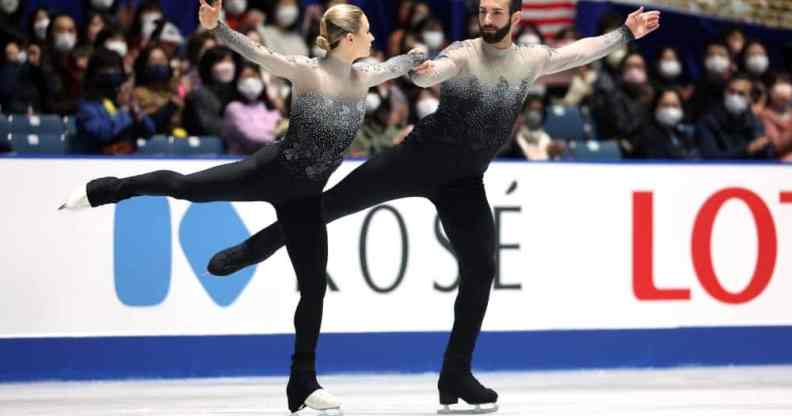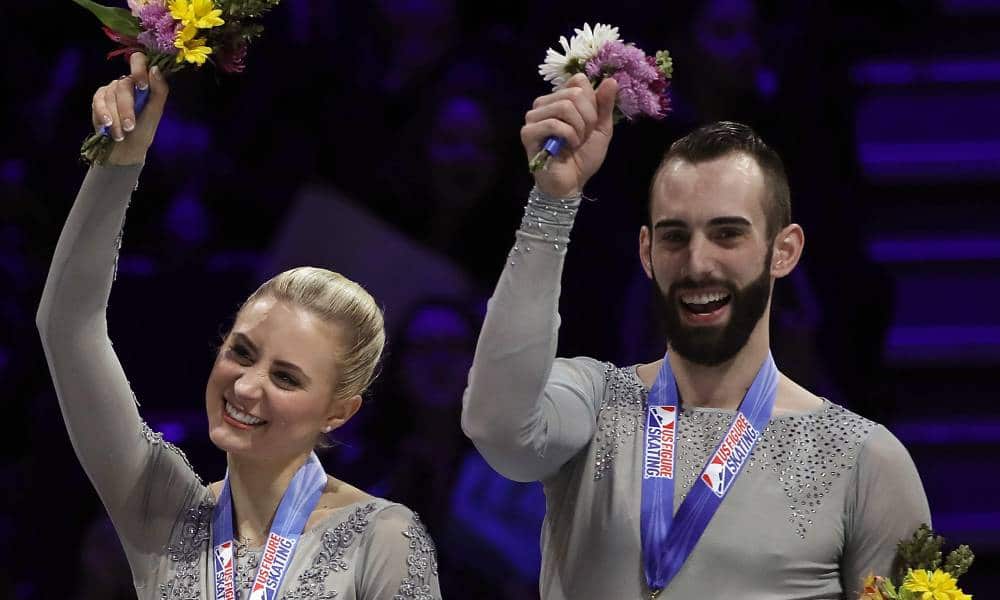Figure skater Timothy LeDuc poised to become first out non-binary athlete at Winter Olympics

USA’s Ashley Cain-Gribble and Timothy LeDuc (R) compete at the ISU Grand Prix of Figure Skating on 13 November 2021 in Tokyo, Japan. (Atsushi Tomura/International Skating Union via Getty)
Non-binary figure skater Timothy LeDuc could make history at the Winter Olympics 2022 next month.
LeDuc is no stranger to firsts. In 2019, they were heralded the first out gay athlete to win a US pairs title with their skating partner, Ashley Cain-Gribble.
They have since come out as non-binary, and are preparing to compete in the US figure skating championships in the hopes of locking down spots on Team USA for the Beijing Winter Olympics.
If successful, they will be the first out non-binary person to take part in the Winter Olympics.
LeDuc told NBCLX’s My New Favorite Olympian podcast that it can be “very complicated sometimes” for them to navigate the “gendered sport” of figure skating as a person that “exists and really thrives outside the binary”.
“I couldn’t hide my queerness,” LeDuc recalled. “I had a tryout with a girl once, and she decided not to skate with me because she thought me being gay was going to be a liability.”
They also recalled an incident with a coach who pulled them aside at a “world-level competition” and told them to show the crowd “how masculine you are”.
“There are going to be people that don’t understand it,” LeDuc added. “You know, they look at me, they see that I have a beard or they look at maybe my physical characteristics and say: ‘You’re a boy, act like a boy. What are you doing?’”
Timothy LeDuc could become the first publicly out non-binary athlete to compete at a #WinterOlympics.
Get to know @USFigureSkating's non-binary trailblazer on the latest episode of @NBCLX's #MyNewFavoriteOlympian podcast: https://t.co/422eiZ010U pic.twitter.com/GfHF690kNM
— NBC Olympics & Paralympics (@NBCOlympics) January 5, 2022
Timothy LeDuc found acceptance when they entered their partnership with Ashley Cain-Gribble in 2016.
Cain-Gribble explained on the podcast that the duo “never wanted to be what was looked at as the traditional team”.
“They always had the storyline of the male is super masculine and strong and always [saves] the girl who is a wilted little flower and is weak, or it was a full-on love story, where obviously a male and a female fall in love with each other,” she said.
LeDuc didn’t think Cain-Gribble was “really ever interested in the fragile girl” trope as she is “such a powerful, amazing athlete”. So the pair decided to break boundaries and create their own narrative that spoke to both of their experiences.
They explained: “So for her, when I kind of came to her and said: ‘You know, I don’t really want to do this romantic style. It doesn’t really seem like us,’ she was like: ‘Heck yeah, I’m good with that.'”

Ashley Cain-Gribble and Timothy LeDuc stand on the podium after winning the pairs competition at the 2019 US Figure Skating Championships. (Getty/Gregory Shamus)
Timothy LeDuc is among a growing list of openly LGBT+ athletes at the highest levels of sport.
At least 186 out LGBT+ athletes took part in the Tokyo Summer Olympics last year – a record-breaking number.
It was three times the number that took part in the 2016 games in Rio, which saw 56 openly LGBT+ people compete.
In 2021, Canadian footballer Quinn became the first openly trans Olympic medal winner at the Tokyo games after their team, Canada, beat Sweden in the women’s football final, winning gold. New Zealand weightlifter Laurel Hubbard became the first out trans woman to compete in the games, but she failed to medal.
Non-binary skateboarder Alana Smith made history as the first openly non-binary athlete to compete for Team USA in Tokyo. Their landmark performance was marred by misgendering from commentators – even though their pronouns were prominently etched into their skateboard.
Australia’s Robyn Lambird became the first out non-binary athlete to win a medal at the Paralympics in 2021. The wheelchair racer won bronze in the Women’s 100-metre T34 sprint in a nail-bitingly close race in August.

